The reactions of my family and friends to my trip to Ukraine last Sunday were almost universally a variation of “You went from one war to another?”
I had returned to The Jerusalem Post four days before; three weeks before that, I was in the middle of Gaza.
After 120 days in military reserves, it had been difficult to acclimatize to civilian life. I still was in the mindset of an infantryman; and walking around without my uniform, in civilian clothes, made me feel like an impostor. Without my rifles, a part of me was missing, and instead of those burdens I felt guilty for having been released when the war is still ongoing, when there are still soldiers fighting, and hostages are still in Hamas captivity.
The truth is, in some measure I felt more at ease in Ukraine than back at the Post’s office in Jerusalem. During my week in the beleaguered country, I was reminded of the Gaza periphery towns. Part of it was the stale tension and background radiation of a general threat, part of it were the signs and symbols of a nation at war. Being close to the action, to have the sirens rouse my tinnitus again, eased the weight of guilt ever so slightly.
Ukraine and Israel: How two nations handle war
Like in Israel, the display of patriotism is everywhere, but it is even more exaggerated in Ukraine. Israeli flags were replaced with Ukrainian flags, fluttering on every lamppost, every car, every building. Just like many buildings in Israel display the colors of blue and white, it seemed that everything in Ukraine that could be painted blue and yellow invariably was.

But no amount of colorful paint could hide the depressing sight of boarded-up shops, shattered windows, and hollowed-out homes. Some buildings that were destroyed almost two years ago still stand in ruins. It makes me fear that the scars I witnessed in kibbutzim like Kissufim and Kfar Aza, the collapsed and burned-out buildings, would be slow to be bandaged up.
Propaganda is also everywhere. In Israel, it takes the form of statements like “Together we will win” or posters of hostages and calls to “Bring them home.” In Ukraine, there is a bit more flair for the dramatic: action-movie posters of Ukrainian service people, some of them facing down zombies or orcs in Russian uniforms. Commercials for the Azov battalion on the train showed a fast-paced showdown. There are recruitment advertisements everywhere.
In contrast to Israel, where there is no lack of volunteers, manpower has become an issue in Ukraine. Every Ukrainian I spoke to said that just about everyone who can volunteer has; their concern seems to be more about having troops than the supply of weapons that occupies their allies in the Western halls of power.
In Israel, we have the luxury of cycling out soldiers, of releasing reservists like me for a few months. For those on the Russian front, there is no such degree of respite, according to locals. Soldiers could be seen everywhere in Ukraine, mostly on leave to visit home, similar to Israel. Like in the South, there are checkpoints dotting the roads closer to the border.
Ukrainian civilians have fled from many of the areas closer to Russia or the front. It is difficult to think of them this way, but like Ukraine we also have internally displaced people, forced out of their homes near Gaza and the Lebanese border, trying to pick up their lives in alien cities, hoping to return home one day. For the Ukrainians, this horizon seems farther off.
As my battalion entered Gaza in December, though fighting was difficult, there was no doubt that we were in control of the situation and could win, if international politics allows. The Ukrainians I spoke to seemed less concerned about diplomacy. Israel faces challenges from Hamas and Hezbollah that could cause cracks in the country’s foundation, since its citizens don’t feel safe to return to the North and South. But in Ukraine, there is a real existential threat, like a war of independence.
A sense of exhaustion pervades in Ukraine. While “uncertainty” was the operative word for the Israel-Hamas war, as it is in every war, it is felt more profoundly in Ukraine. Many expressed that they didn’t know what the future held for them, and for now all they could do was maintain their present as best they could.
They have settled into a routine that is frequently interrupted by air raid sirens. In places like Odesa and Poltava, the air raid sirens are quieter than those in Israel, and more than often ignored. Their alert systems raise the alarm across whole oblasts, while Israel’s is accurate to neighborhoods.
People must return to routine; it is impossible to remain in a state of crisis for a long period. So while it may seem odd that people in Kyiv and Tel Aviv sit in coffee shops and bars, they must. As the brave reservist Ari Zenilman once said, this is part of the life that soldiers fight to protect.
